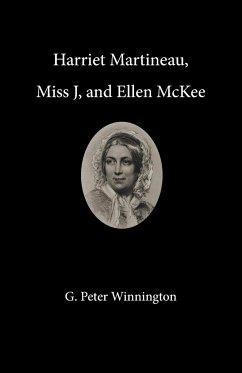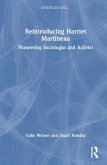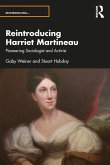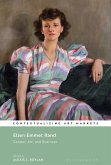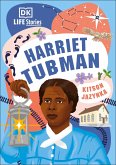Harriet Martineau (the feminist and thinker 'who made the nineteenth century the dawn of freedom for half the human race') was certainly the most intelligent woman of her time, and she argued with uncompromising logic (which led her to abandon all religious faith, for instance). Between 1834 and 1836, Martineau travelled throughout America, interviewing everyone she met, from the President down to a black slave girl. On her return she wrote Society in America (1837), a pioneering work of sociology. (For his contemporaneous Démocratie en Amérique, de Tocqueville spoke only to white men, and in broken English at that.) Because she was very deaf, she took with her a companion-cum-assistant whom she referred to (in her Autobiography) as 'Miss J'. Martineau described Miss J as 'remarkably clever, supremely rational, and with a faultless temper,' and admitted that she 'owed' Society in America to her. They became life-long friends, yet she was first named in print only in 1935; a Martineau scholar mis-identified her as recently as 2007. Using previously unexploited books and letters, Peter Winnington uncovers the life of Miss J, who was an orphan by the age of nine; she was brought up by caring relatives. But she was well connected, being the niece of Samuel Courtauld, who founded the company bearing his name that became Britain's largest manufacturer of women's underwear. Miss J's schoolfriend, Mary Barnes, married the Unitarian minister and writer, John Relly Beard, and Miss J married his assistant, James McKee. For their daughter Ellen, Harriet Martineau seems to have served as a kind of honorary aunt. Encouraged by her cousin Peter Taylor and his wife Mentia ('the mother' of the English women's parliamentary suffrage movement), Ellen McKee embarked on a life directed towards giving women a voice in local government, becoming one of fewer than thirty women elected to the London School Board during the thirty years of its existence. In this context she also sought to provide suitable facilities for London's physically impaired children, particularly the deaf, just as her friend Mary Dendy (John Relly Beard's granddaughter) was doing in Manchester at exactly the same time. Thus both women were working (in the Beard tradition) toward what Harriet Martineau would have wanted. In telling the lives of Miss J and her daughter, this book reveals previously unnoticed connections between famous people, and an unrecorded episode in Harriet Martineau's life when she attempted to use Mesmerism to help one of Miss J's aunts.
Hinweis: Dieser Artikel kann nur an eine deutsche Lieferadresse ausgeliefert werden.
Hinweis: Dieser Artikel kann nur an eine deutsche Lieferadresse ausgeliefert werden.

